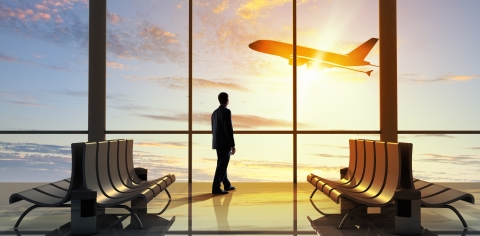U.S. Travel Industry Releases Guidance for "Travel in the New Normal"

Taking a big step to chart a course forward, the U.S. travel industry submitted to the White House and governors a document containing detailed guidance for travel-related businesses to help keep their customers and employees safe as the country emerges from the COVID-19 pandemic.
Entitled "Travel in the New Normal," the document describes vigorous measures the travel industry will follow to reduce the risk of COVID-19 and help to communicate across each and every step of a traveler's journey.
The goal: to allow travel to safely resume as states and municipalities relax physical distancing guidance.
The report is a collaboration between medical experts and a broad array of businesses and organizations.
"We want political leaders and the public alike to see that our industry is setting a very high standard for reducing the risk of coronavirus in our businesses, and that the practices in place to achieve that standard are consistent through every phase of the travel experience," said U.S. Travel Association President and CEO Roger Dow.
He added, "As travel reopens, travelers need the confidence that safety measures are in place from their departure to their return home."
The travel industry has been hit especially hard by the public health crisis; the industry is estimated to have lost eight million jobs as of the first of May, and the travel-related economic impact of coronavirus is projected to be nine times worse than 9/11.
The well-being of employees and guests is always the No. 1 priority of travel businesses, Dow said. But a secondary objective of the "Travel in the New Normal" guidance is to restore consumers' confidence in the travel process, in the hope that travel demand will rebound quickly and the industry can help power a robust economic and jobs recovery.
"We will not encourage people to travel until public health experts and authorities have made it clear that it's the right time to do so," Dow said. "Our industry's focus is on preparing for that moment, and on demonstrating that our preparations are comprehensive and informed by the counsel of top experts.
"The ability to travel freely is not only a fundamental part of the American way of life, but also supports the livelihoods of millions," Dow said. "We are very determined to return to travel and the new normal as quickly as circumstances will allow."
The "Travel in the New Normal" guidance is focused on six main areas, with the document providing specific examples for each:
- Travel businesses should adapt operations, modify employee practices and/or redesign public spaces to help protect employees and customers.
- Travel businesses should consider implementing touchless solutions, where practical, to limit the opportunity for virus transmission while also enabling a positive travel experience.
- Travel businesses should adopt and implement enhanced sanitation procedures specifically designed to combat the transmission of COVID-19.
- Travel businesses should promote health screening measures for employees and isolate workers with possible COVID-19 symptoms and provide health resources to customers.
- Travel businesses should establish a set of procedures aligned with CDC guidance should an employee test positive for COVID-19.
- Travel businesses should follow best practices in food and beverage service to promote health of employees and customers.
"The 'Travel in the New Normal' guidance—as well as the entire effort to produce this work—can serve as a model for collaboration between the business and medical communities that forges a path toward healing both the public health and the economy," Dow said. "My deepest thanks to all of the organizations that partnered together in its development and all who will be instrumental as we move towards recovery.
"This collaboration is something that should help our customers, our businesses and the industry as a whole to move beyond the most challenging period any of us has ever faced."
Click here to read the "Travel in the New Normal" document in its entirety.


Add new comment